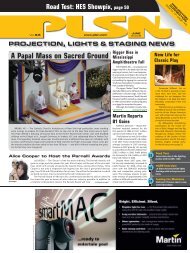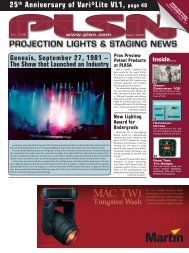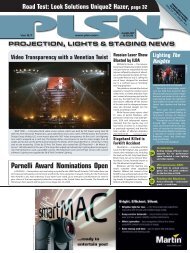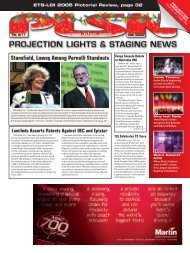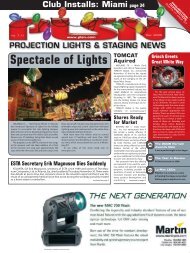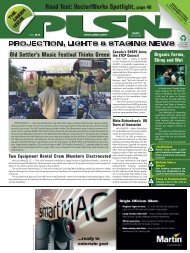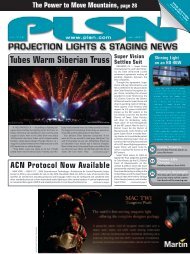Download a PDF - PLSN.com
Download a PDF - PLSN.com
Download a PDF - PLSN.com
You also want an ePaper? Increase the reach of your titles
YUMPU automatically turns print PDFs into web optimized ePapers that Google loves.
TECHNOLOGY ASSOC IATION<br />
EDITOR’SNOTE<br />
Ad info: www.plsn.<strong>com</strong>/rsc<br />
Hopper, Kooper And The<br />
Super Duper<br />
Blooper<br />
Al was not your average, ordinary 20 year<br />
old. He was ac<strong>com</strong>plished enough as a<br />
musician to be invited to an important<br />
recording session with a major artist. Still, he<br />
was a bit intimidated when he arrived at the<br />
session, guitar in hand, and found Michael<br />
Bloomfield, bluesman extraordinaire, already<br />
unpacking his guitar. He knew he was out of<br />
his league. He didn’t unpack his own guitar,<br />
but he didn’t give up either.<br />
Instead, he quietly slipped into<br />
the control room and sat next to<br />
the producer, looking for an opportunity.<br />
Maybe the drummer would<br />
spontaneously <strong>com</strong>bust, or the<br />
bass player wouldn’t show up. Then<br />
it happened.<br />
No, the drummer didn’t go up in a cloud<br />
of smoke, but the organ player did get up and<br />
move over to the piano. Al’s eyes lit up. Turning<br />
to the producer, he asked if he could go<br />
and sit in on the organ.<br />
“Oh, Al, you’re not an organ player,” the<br />
producer responded.<br />
“But I have the perfect part for this song,”<br />
Al insisted. He was bluffing. He really had little<br />
more than the burning desire to play on<br />
the record. But the producer saw right<br />
through him.<br />
After some back and forth, the producer<br />
got a phone call and left the room. Al quietly<br />
slipped behind the plastic keys of the organ.<br />
When the producer came back and saw him<br />
“I have the perfect part<br />
for this song,” Al insisted.<br />
He was bluffing.<br />
at the keyboards, he gave Kooper a hard time.<br />
“What are you doing?” the producer said. But<br />
he let Kooper stay on the keys.<br />
I once saw a locally produced broadcast—<br />
and I use the word “produced” very loosely—<br />
of a presentation given by a very short, whitehaired<br />
lady in a Navy uniform. I was instantly<br />
captivated by the little lady’s huge stature as<br />
RichardCadena<br />
she described her rise through the ranks of<br />
the Navy. She started as a <strong>com</strong>puter programmer,<br />
one of the first in the world. She<br />
programmed the Mark I <strong>com</strong>puter<br />
in 1943 and in 1973 she became the<br />
first U.S. citizen and the first woman<br />
to be<strong>com</strong>e a Distinguished Fellow of<br />
the British Computer Society. She said<br />
she kept a clock that ran backwards<br />
on the wall behind her desk in her office to<br />
illustrate that just because “it’s always been<br />
done that way,” there’s no reason not to do<br />
things differently. She handed out “nanoseconds”<br />
in the form of lengths of wire about a<br />
foot long the distance that electrons travel in<br />
one nanosecond to illustrate that, in order to<br />
be fast, <strong>com</strong>puters had to be small. Then she<br />
would hold up a “millisecond,” a coil of wire<br />
about a thousand feet long. But the most vivid<br />
message she delivered was one I’ll never forget.<br />
“It’s much easier,” she said, “to apologize<br />
than it is to get permission.” The speaker was<br />
the late, great Rear Admiral Grace Hooper.<br />
If you listen to the recording of Bob<br />
Dylan’s “Like a Rolling Stone” you’ll notice that<br />
the organ always <strong>com</strong>es in an eighth note behind<br />
the rest of the band. You see, Al Kooper<br />
was not a keyboard player. He was the guitar<br />
player who showed up to the recording session<br />
to find Michael Bloomfield there, a guitar<br />
player who, by Kooper’s own admission, was<br />
far and away a much better player than he. So<br />
when Kooper slipped behind the keyboard to<br />
play that song, he was waiting until he heard<br />
the rest of the band to confirm that he was<br />
playing the right chords. Apparently he was.<br />
Later on, when everyone was in the control<br />
room listening to the playback, Dylan<br />
asked the producer to turn up the organ.<br />
The producer protested, saying that Kooper<br />
wasn’t a real organ player. Dylan didn’t care;<br />
he liked what he heard.<br />
That song turned out to be one of Dylan’s<br />
earliest and biggest hits, and the organ part<br />
is its signature sound. But had Kooper waited<br />
for permission to play the organ it never<br />
would have happened. Kooper took a chance,<br />
even though he wasn’t trained for the task he<br />
took on.<br />
I’m not sure Kooper knew who Rear Admiral<br />
Hooper was, but he was following her<br />
advice anyways. You should too.<br />
I see a lot of young aspiring production<br />
professionals waiting for permission to start<br />
their career, to learn AutoCAD, to take on a<br />
lighting design, basically to do anything for<br />
which they don’t feel <strong>com</strong>fortable doing.<br />
Waiting for permission is not the conventional<br />
way to greatness. Greatness takes risk,<br />
it takes guts and it sometimes takes making<br />
a lot of mistakes even very big mistakes. I’m<br />
talking colossal blunders, super-duper bloopers.<br />
But it doesn’t take permission.<br />
The judicious application of Hopper’s axiom<br />
just do it is the first step towards greatness.<br />
Don’t wait for permission to take a bold step in<br />
your life. Take a big chance today.<br />
The Publication of Record for the Lighting,<br />
Staging and Projection Industries<br />
Publisher<br />
Terry Lowe<br />
tlowe@plsn.<strong>com</strong><br />
Editor<br />
Richard Cadena<br />
rcadena@plsn.<strong>com</strong><br />
Editorial Director<br />
Bill Evans<br />
bevans@fohonline.<strong>com</strong><br />
Associate Editor<br />
Jacob Coakley<br />
jcoakley@plsn.<strong>com</strong><br />
Contributing Writers<br />
Vickie Claiborne, Phil Gilbert,<br />
Cory FitzGerald,Rob Ludwig,<br />
Kevin M. Mitchell, Richard<br />
Rutherford, Brad Schiller,<br />
Nook Schoenfeld, Paul J. Duyree<br />
Photographers<br />
Steve Jennings, Bree Kristel<br />
Art Director<br />
Garret Petrov<br />
gpetrov@plsn.<strong>com</strong><br />
Production Manager<br />
Linda Evans<br />
levans@plsn.<strong>com</strong><br />
Graphic Designers<br />
Dana Pershyn<br />
dpershyn@plsn.<strong>com</strong><br />
Josh Harris<br />
jharris@plsn.<strong>com</strong><br />
National<br />
Advertising Director<br />
Gregory Gallardo<br />
gregg@plsn.<strong>com</strong><br />
Advertising Representative<br />
James Leasing<br />
jleasing@plsn.<strong>com</strong><br />
General Manager<br />
William Hamilton Vanyo<br />
wvanyo@plsn.<strong>com</strong><br />
Executive Administrative<br />
Assistant<br />
Dawn-Marie Voss<br />
dmvoss@plsn.<strong>com</strong><br />
Business and<br />
Advertising Office<br />
6000 South Eastern Ave.<br />
Suite 14J<br />
Las Vegas, NV 89119<br />
Ph: 702.932.5585<br />
Fax: 702.932.5584<br />
Toll Free: 800.252.2716<br />
Editorial Office<br />
10305 Salida Dr.<br />
Austin, TX 78749<br />
Ph: 512.280.0384<br />
Fax: 512.292.0183<br />
Circulation<br />
Stark Services<br />
P.O. Box 16147<br />
North Hollywood, CA 91615<br />
Projection, Lights & Staging News (ISSN:<br />
1537-0046) Volume 07, Number 07 Published monthly<br />
by Timeless Communications Corp. 6000 South<br />
Eastern Ave., Suite 14J Las Vegas, NV 89119 It is<br />
distributed free to qualified individuals in the<br />
lighting and staging industries in the United<br />
States and Canada. Periodical Postage paid<br />
at Las Vegas, NV office and additional offices.<br />
Postmaster please send address changes to:<br />
Projection, Lights & Staging News, PO Box<br />
16147 North Hollywood, CA 91615. Mailed in<br />
Canada under Publications Mail Agreement<br />
Number 40033037, 1415 Janette Ave., Windsor,<br />
ON N8X 1Z1 Overseas subscriptions are available<br />
and can be obtained by calling 702.932.5585.<br />
Editorial submissions are encouraged but must include<br />
a self-addressed stamped envelope to be<br />
returned. Projection, Lights & Staging News is a<br />
Registered Trademark. All Rights Reserved.<br />
Duplication, transmission by any method of<br />
this publication is strictly prohibited without<br />
permission of Projection, Lights & Staging News.<br />
ESTA<br />
ENTERTAINMENTSERVICES &<br />
<br />
<strong>PLSN</strong> August 2006<br />
www.<strong>PLSN</strong>.<strong>com</strong>



